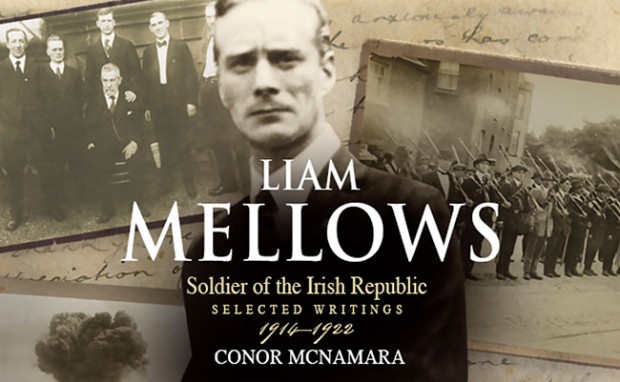26 March 2020 Edition
A remarkable Irish revolutionary

Liam Mellows – Soldier of the Irish Republic – Selected Writings 1914-1922
By Conor McNamara. Published by Irish Academic Press, €18.95.
As I was finishing this book both Mícheál Martin and Leo Varadkar were in the news for again trying to rubbish the idea of an Irish Unity referendum. They demonstrated how prophetic were the words of Liam Mellows in his Dáil speech against the Treaty:
“The time will inevitably come, if this Free State comes into existence, when you will have a permanent government in the country, and permanent governments in any country have a dislike to being turned out, and they will seek to fight their own corner before anything else. Men will get into positions, men will hold power, and men who get into positions and hold power will desire to remain undisturbed and will not want to be removed, or will not take a step that will mean removal in case of failure.”
In that speech Mellows was countering the stepping-stones argument which defended the Treaty on the basis that it could be used to get to the Republic and Irish Unity. The enduring influence of Mellows on Irish republicanism probably lies most significantly in his identification of the vested interests who were lining up to back the Free State and who in the years after his execution in Mountjoy Jail would entrench a conservative, repressive state in the 26 Counties.
In his writings from Mountjoy Mellows analysed the economic and political forces backing the Free State and urged a socialist direction for Irish Republicans. It was a call that could not be implemented then, in the midst of a disastrous Civil War or counter-revolution, but it was a blueprint for the future.
Conor McNamara has done a good service in collecting the writings of Liam Mellows including articles, speeches and letters, in this one volume. And it is as such a collection that the book succeeds. At times it is difficult to tell if the author is attempting a biography because he makes some arguments and draws some firm conclusions that are more suited to a full biography than as relatively brief notes for collected writings.
The definitive biography of Mellows remains ‘Liam Mellows and the Irish Revolution’ by C. Desmond Greaves but the author here seems want to refute the assessment of Mellows by both Greaves and Peadar O’Donnell. While the latter two can be criticised for perhaps trying to fit Mellows too neatly into a strict Marxist interpretation of the Irish revolution, I think Conor McNamara goes too far in the opposite direction.
For example, he is stretching his interpretation of one letter too far by saying it showed Mellows wanted a Catholic Irish state. In his notes he also omits the personal and political influence of James Connolly on Mellows, with only two references to Connolly in the book. It was in Dublin with Connolly that Mellows was introduced to socialist ideas, not later in New York as stated here.
Was Mellows “a troubled individual who hid his despair behind a mask of frivolity”? That is a big statement to make but it is not adequately sustained by any evidence presented here. Certainly he was driven to near despair by the disgraceful way he was treated by a section of Irish Americans during his time in the States, but he was also careful not to let this get in the way of the cause. Having said all this, the primary purpose of the book is to present the words of Mellows himself and this is its great value. His speeches in the USA would be new to most people and these along with more familiar writings, as well as the letters, form a positive picture of a remarkable Irish revolutionary.
• Mícheál Mac Donncha is a Dublin City Sinn Féin councillor




